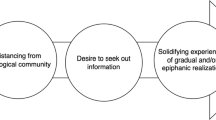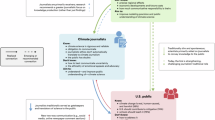Abstract
The science and practice of climate change communication have significantly evolved over the last two decades, leading to a subfield of environmental communication focused on perception, awareness, and risk associated with climate change. This body of literature has demonstrated the importance of recognizing the differences among individuals and social groups in terms of cultural, psychological, and political reasons for their perceptions regarding climate change and has provided guidance for communicating with target audiences. However, most of the research in this subfield has relied on quantitative data from nationally representative survey instruments. While such metrics are essential to understanding longitudinal trends in public perceptions, they are limited in providing deeper understanding of how an individual perceives climate change in relation to other environmental and social issues. Qualitative data, elicited through techniques such as focus groups and semi-structured interviews, can help to provide these insights. In addition, qualitative research can support a more relational approach to climate change communication, which emphasizes the importance of seeing science communication as an opportunity to connect, rather than to persuade. In this paper, we present findings from semi-structured interviews (“environmental conversations”) with fifteen individuals based in the United States regarding their opinions, knowledge, and perceptions of climate change and other environmental issues. The findings demonstrate nuance and diversity in people’s opinions on climate change and how they are connected to other priorities and values. We recommend the value of qualitative research as a tool not only to better understand different environmental perspectives, but additionally to support two-way science communication among the broader public.
Similar content being viewed by others
Explore related subjects
Discover the latest articles and news from researchers in related subjects, suggested using machine learning.References
Bloomfield EF, Tillery D (2019) The circulation of climate change denial online: rhetorical and networking strategies on Facebook. Environ Commun 13(1):23–34. https://doi.org/10.1080/17524032.2018.1527378
Bryanov K, Watson BK, Pingree RJ, Santia M (2020) Effects of partisan personalization in a news portal experiment. Public Opin Q 84(S1):216–235. https://doi.org/10.1093/poq/nfaa011
Burke K (1969) A Rhetoric of Motives. University of California Press, Berkeley and Los Angeles, CA
Cairney P, Oliver K (2017) Evidence-based policymaking is not like evidence-based medicine, so how far should you go to bridge the divide between evidence and policy? Health Res Policy Syst 15:1–11
Centola D (2018) How behavior spreads: the science of complex contagions, vol 3. Princeton University Press, Princeton, NJ
Centola D (2021) Change: how to make big things happen. John Murray
Chapman DA, Lickel B, Markowitz EM (2017) Reassessing emotion in climate change communication. Nat Clim Chang 7:848–852
de Lange E, Milner-Gulland E, Keane A (2019) Improving environmental interventions by understanding information flows. Trends Ecol Evol 34(11):1034–1047
De Meyer K, Coren E, McCaffrey M, Slean C (2020) Transforming the stories we tell about climate change: from ‘issue’to ‘action.’ Environ Res Lett 16(1):015002
Drummond C, Fischhoff B (2017) Individuals with greater science literacy and education have more polarized beliefs on controversial science topics. Proc Natl Acad Sci 114:9587–9592
Gaudette T, Scrivens R, Davies G, Frank R (2020) Upvoting extremism: Collective identity formation and the extreme right on Reddit. New Media Soc 23. https://doi.org/10.1177/1461444820958123
Goldberg MH, Gustafson A, Ballew MT, Rosenthal SA, Leiserowitz A (2020). Identifying the most important predictors of support for climate policy in the United States.Behav Public Policy 1–23. https://doi.org/10.1017/bpp.2020.39
Jagannathan K, Pathak TB, Doll D (2023). Are long-term climate projections useful for on-farm adaptation decisions? Frontiers in Climate 4
Kahan DM, Peters E, Wittlin M, Slovic P, Ouellette LL, Braman D, Mandel G (2012) The polarizing impact of science literacy and numeracy on perceived climate change risks. Nat Clim Chang 2:732–735
Kahan D (2013) Making climate-science communication evidence-based. Cult Pol Clim Change: How Info Shapes Our Common Future 203–220
Kalla JL, Broockman DE (2022) Voter outreach campaigns can reduce affective polarization among implementing political activists: evidence from inside three campaigns. Am Political Sci Rev 116:1516–1522
Kearns F (2021) Getting to the heart of science communication: a guide to effective engagement. Island Press
Lertzman R (2017) Tackling Apathy and Denial. Climate 2020:62–65
Lertzman R (2019) New methods for investigating new dangers: on the radical practice of listening. Clim Psychol: On Indifference disaster 25–39
Lewandowsky S, Oreskes N, Risbey J, Newelle B, Smithson M (2015) Seepage: Climate change denial and its effect on the scientific community. Glob Environ Chang. https://doi.org/10.1016/j.gloenvcha.2015.02.013
Lewandowsky S, Smillie L, Garcia D, Hertwig R (2020) Technology and Democracy: Understanding the influence of online technologies on political behaviour and decision-making. Publications Office of the European Union. https://ec.europa.eu/jrc/en/publication/eur-scientific-and-technical-research-reports/technology-and-democracy
Li N, Su LY-F (2018) Message framing and climate change communication: a meta-analytical review. J Appl Commun 102:1c–1c
McCright AM, Dunlap RE (2011b) The politicization of climate change and polarization in the American public’s views of global warming, 2001–2010. The Sociological Quarterly
McCright AM, Dunlap RE (2011a) Cool dudes: The denial of climate change among conservative white males in the United States. Glob Environ Chang 21(4):1163–1172. https://doi.org/10.1016/j.gloenvcha.2011.06.003
Nelson J (2020) Petro-masculinity and climate change denial among white, politically conservative American males. Int J Appl Psychoanal Stud 17(4):282–295
Nerlich B, Koteyko N, Brown B (2010) Theory and language of climate change communication. Wiley Interdisc Rev: Clim Change 1:97–110
Nielsen JO, D’haen SAL (2014) Asking about climate change: Reflections on methodology in qualitative climate change research published in Global Environmental Change since 2000. Global Environ Change 24:402–409. https://doi.org/10.1016/j.gloenvcha.2013.10.006
Palm R, Lewis GB, Feng B (2017) What causes people to change their opinion about climate change? Ann Am Assoc Geogr 107:883–896
Roser-Renouf C, Stenhouse N, Rolfe-Redding J, Maibach E, Leiserowitz A (2014) Engaging diverse audiences with climate change: message strategies for global warming’s Six Americas. In SSRN Electronic Journal. https://doi.org/10.2139/ssrn.2410650
Toomey AH (2016) What happens at the gap between knowledge and practice? Spaces of encounter and misencounter between environmental scientists and local people. Ecol Soc 21
Toomey AH, Domroese MC (2013) Can citizen science lead to positive conservation attitudes and behaviors? Hum Ecolol Rev 50–62
van der Linden S, Panagopoulos C, Azevedo F, Jost JT (2020) The paranoid style in American politics revisited: an ideological asymmetry in conspiratorial thinking. Polit Psychol. https://doi.org/10.1111/pops.12681
Wolf J, Moser SC (2011) Individual understandings, perceptions, and engagement with climate change: insights from in-depth studies across the world. Wiley Interdisc Rev: Clim Change 2:547–569
Zia A, Todd AM (2010) Evaluating the effects of ideology on public understanding of climate change science: how to improve communication across ideological divides? Public Underst Sci 19:743–761
Acknowledgements
This study benefited from support by Matthew Aiello-Lammens and Michelle Land. We would also like to thank the interviewees for their willingness to speak with us about their perceptions and beliefs.
Author information
Authors and Affiliations
Contributions
All authors contributed to the study conception and design. Material preparation, data collection and analysis were performed by Scott Kleinberg, with support from Anne Toomey. The first draft of the manuscript was written by Scott Kleinberg and all authors commented on previous and subsequent versions of the manuscript. All authors read and approved the final manuscript.
Corresponding author
Ethics declarations
Competing interests
The authors declare no competing interests.
Additional information
Publisher’s note
Springer Nature remains neutral with regard to jurisdictional claims in published maps and institutional affiliations.
Rights and permissions
Springer Nature or its licensor (e.g. a society or other partner) holds exclusive rights to this article under a publishing agreement with the author(s) or other rightsholder(s); author self-archiving of the accepted manuscript version of this article is solely governed by the terms of such publishing agreement and applicable law.
About this article
Cite this article
Kleinberg, S., Toomey, A.H. The use of qualitative research to better understand public opinions on climate change. J Environ Stud Sci 13, 367–375 (2023). https://doi.org/10.1007/s13412-023-00841-w
Accepted:
Published:
Issue Date:
DOI: https://doi.org/10.1007/s13412-023-00841-w




